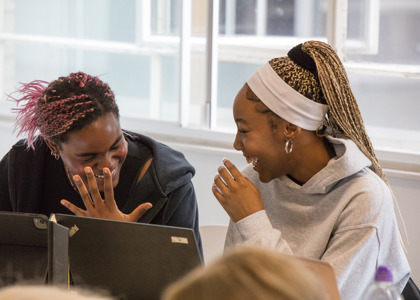
One of the most frequent questions we get asked by prospective students is whether they should study our Level 3 Fashion Design, Level 3 Fashion Retail, or Level 3 Visual Communications & Styling course.
20th May 2025
 Back
Back
Date 14th February 2022
All information is accurate at the time of publication. Please check individual course pages for the most up-to-date information.
Actors, TV presenters, musicians, politicians, famous influencers - they’re often dressed in the perfect outfit for the occasion. But how do they always pull off the right look? Many of them have a secret: their wardrobe was created by a professional fashion stylist.
Becoming a fashion stylist is one of the most desirable and sought-after careers in the industry. If you’re excited about aesthetics, up-to-date on the latest trends and confident in your sense of style, a career as a fashion stylist could be perfect for you!
As a stylist, you’ll be responsible for all aspects of a person’s visual aesthetic. You’ll need to create and maintain a curated image for someone, by designing and coordinating what they wear. You could be working with anyone from the most famous celebrities, to models on a photoshoot, to someone who just wants to look their best for a specific event.
When they’re doing press and red carpet, celebrities are trying to communicate an image that will help to promote a film, themselves as actors, or as business people
Kate Young, Fashion Stylist for Margot Robbie, Dakota Johnson, Selena Gomez and Sophie Turner
Stylists are employed everywhere, from magazines to advertising campaigns, music videos to concert performances, political campaign trails to red carpet events. They often work as part of a larger creative team put together for a specific project.
Throughout their careers, they work alongside a huge range of other professionals: models, photographers, hairstylists, makeup artists, costume designers, creative/art directors, editors, studio coordinators, content managers, producers…
It’s a fast-paced, challenging role: deadlines are tight and standards are high! You’ll need to thrive on being busy, quickly solving problems, working with others and using your creative skills to make it as a fashion stylist.
As a stylist, you could be working on an almost endless number of projects. From professional photoshoots, magazine features, advertising campaigns, music videos, album covers, TV show appearances, stage outfits for a tour or red carpet events. You could also work as a Wardrobe Stylist for a movie or TV show, creating costumes for characters alongside a costume designer.
When you consider the number of jobs you could be involved in, it’s no surprise that to be successful, you’ll need to know the fashion industry like the back of your hand! Staying on top of trends in the styling world is very important; stylists spend time researching new styles or predicting future trends.
Basia Richards is a fashion stylist who's worked for celebrities including Selena Gomez and Victoria Justice. She says, "I spend a lot of time on a computer doing research. I'm researching different looks, making appointments, gathering all the pieces for a look. It's a lot of screen time!”
As well as researching online, you’ll also need to watch runway shows, visit brand showrooms and attend fashion industry events to keep on top of what’s going on in fashion and culture. Knowing lots of designers and brands can help you develop an expert knowledge of products. A good understanding of the history of fashion, and the styles and trends from past eras, can also be helpful for inspiration and context. You can use this research to create mood boards for clients with ideas for events or upcoming projects.

Once you’ve finalised your ideas, you’ll need to get the items to make them a reality. You’ll need to source products by contacting PR agents or brand showrooms; finding, borrowing and buying clothes, shoes and accessories to bring an outfit together.
If you’re styling a photo shoot or fashion show, you’ll have plenty to do backstage. Along with organising all the looks, you’ll be steaming, pinning, fitting clothes and products to models to make sure they match your vision. You might also plan and advise on makeup and hairstyling to compliment your looks.
It’s your responsibility to look after the products and sample stock you’ve sourced from brands, making sure nothing is damaged so it can be returned on time. Maintaining your reputation is vital to your career; if something you’ve borrowed goes missing, the brand will be reluctant to lend you their items again.
Some of the time, you’ll be based in your studio or office. You’ll regularly need to travel to various locations for meetings and photoshoots. In some roles, you’ll often need to travel internationally as well!
Fashion styling doesn’t have a traditional, formal career path, so everyone’s career journey will be different.
When you start out as a junior stylist for a brand, you’ll most likely be earning between £18,000 and £20,000. More senior stylists usually receive higher salaries between £23,000 and £30,000.
It’s very common to work freelance as a fashion stylist - once you have built up a good reputation you may choose to set up your own business or consultancy. As a freelance worker, you’ll usually be paid either a daily or hourly rate. This could be anything from £50 to £150 a day, or approximately £7.70 to £8.20 per hour.
Stylists who land large corporate or celebrity clients can also make considerably larger salaries. Some stylists even become famous themselves!
Working with celebrities is one of the trickiest parts of the job. You’ll need a strong professional network, as stars only work with people they know they can trust. ”Celebrities are very private people," Basia says. "They like to have people around them who they're comfortable with.”
Fashion styling is a fiercely competitive field, and you’ll need confidence, determination and drive to succeed. It’s also an incredibly exciting and rewarding role, with great opportunities for professional growth and development. A few key skills can also be very helpful starting out, and for the rest of your career journey:
It almost goes without saying that you need a good sense to style to be a stylist! Having an eye for visual composition, proportions and understanding what looks good with what is almost essential.
It’s hard to tell you exactly how I do what I do. It’s a gut instinct
Kate Young
You’ll also need excellent attention to detail, being able to visualise an outfit right down to the tiny accessories that pull a look together. But remember: good taste is personal. Make sure you refine your own aesthetic view as a stylist.
Combine your distinct style with a person’s sense of self, and you’ll earn a reputation as a great stylist.
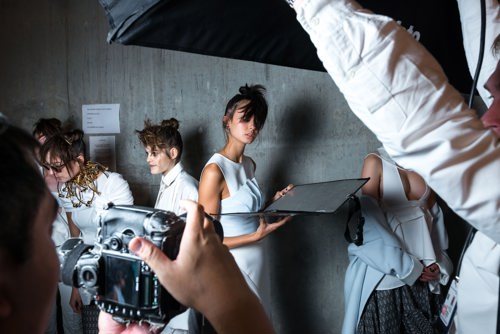
Building a strong network is absolutely vital to becoming a successful stylist. Meeting others in the industry helps you make valuable connections, and build a positive reputation.
Word-of-mouth is the most common way for stylists to reach new clients. Whilst you might get some attention from a client appearing on a red carpet or fashion magazine, most of your new business will come from friends and colleagues of your current clients.
"A lot of this industry works by recommendations," Basia says. "Work for a stylist, become their assistant. The key is to develop a relationship with these stylists so they can recommend you.”
A strong passion for the fashion industry. You’ll need to have an almost encyclopaedic knowledge of designers, brands and trends. You’ll also want to be able to forecast new trends and predict the future direction of the industry. Having a good understanding of photography and lighting can also be very helpful on set.
A styling career is exciting and varied, but this also means it can be hard work. You’ll need to have a good work ethic and focused mindset, with an ability to meet very tight deadlines. Being able to multi-task is also important, especially when you’re working for many clients. Good project management skills will also serve you well.
All of these skills become even more important when running your own business or working freelance.
An inventive and imaginative mind is key in a creative career like styling. You’ll need good initiative and problem-solving skills, to fix issues as they appear. You don’t want one small problem to ruin an entire event or photoshoot for your client.
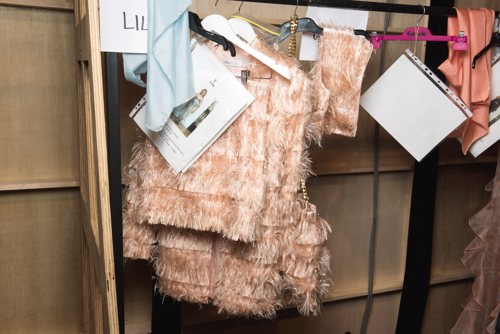
Good people skills are another essential for a stylist. You’ll be working alongside many different people every day, and often join new teams for every project you start. You’ll need to build and maintain relationships with important contacts, from new clients to PR teams at brands.
You’ll also have to provide excellent customer service to your clients. "As a celebrity stylist, you'll be working with lots of different personalities and fashion tastes. You want to make everyone happy and make them comfortable," says Basia.
When I started it was all about magazines and wasn’t about celebrity. Now it’s about celebrity and Instagram, and it’s very fast
Kate Young
In an increasingly online world, don’t underestimate the importance of digital skills in your fashion styling career. You’ll want a strong understanding of social media and marketing principles, especially if you want to work with celebrity clients.
IT skills and being able to use software such as the Adobe Creative Cloud software or CaptureOne will help you create an impressive portfolio for potential clients or inspire mood boards for new projects.
Within the field of styling, academic qualifications are not usually considered as important as creative and practical skills. However, it’s worth noting that some employers will require applicants to have studied towards a relevant qualification within fashion or communication.
You don’t need formal training or qualifications to become a stylist, but it can really help you in the early stages of your career. Understanding how the fashion industry works behind the scenes, the history of style, different types of fabrics and products can all come in useful in your work.
A course or diploma can also give you an edge in a competitive field. By understanding art and fashion history, as well as the workings of the industry as a whole, you’ll help set yourself apart from the competition.
“It’s really important to be well-rounded, to know about design and art, and fashion. I’m less interested in you knowing what look No.23 from Givenchy this season looks like than I am in knowing you have good taste” says Kate Young.
At the Fashion Retail Academy, we have several specialist fashion courses that could help you launch your fashion styling career. If you've just completed your GCSEs, you could study either our Level 3 Fashion Design or Level 3 Fashion Retail courses. If you've already completed college, you could study our Level 4 Fashion Business (With Marketing) diploma or our accelerated BA (Hons) Marketing & Communications undergraduate degree.
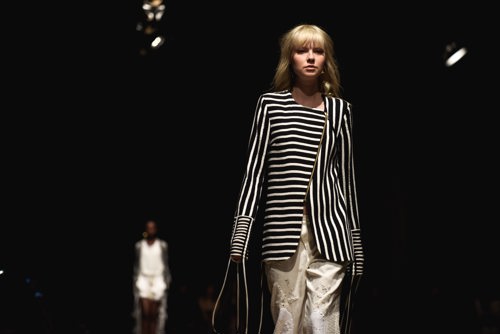
Getting experience and working as an assistant to a stylist means you can learn from professionals, as well as expand your network. Experience in the industry will usually open more doors than a specific course or qualification.
Competition is fierce, so get creative with your experience. Assist with student magazines, start your own style blog or social media account. Employers and new clients will want to see examples of your work in a portfolio or on a website.
“Start a website. Start a blog. Show your work. If you don’t want to go that far, do a curation on Instagram of your styled work. It almost acts as your portfolio. It’s important to have something to show to people so that they understand who you are as a stylist," says Erica Wark, a fashion stylist in Canada.
At the Fashion Retail Academy, all Level 4 and Undergraduate degree programmes have integrated industry experience with one of our retail partners. This supports your studies with practical skills and real-life experience, providing a valuable boost to your CV!
If you'd like more information about our courses and all the exciting career options available in the fashion industry, please email our friendly Applicant Services team at info@fra.ac.uk. We're always happy to help!

One of the most frequent questions we get asked by prospective students is whether they should study our Level 3 Fashion Design, Level 3 Fashion Retail, or Level 3 Visual Communications & Styling course.
20th May 2025

One of our most frequently asked questions is whether prospective students should choose to study one of our Level 4 diplomas or an undergraduate degree.
27th March 2025
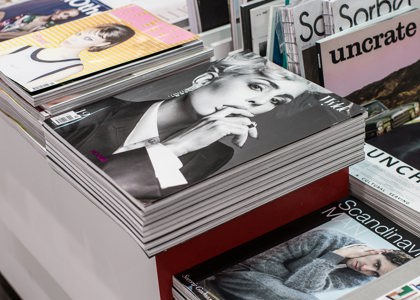
Fashion PR is one of the most exciting, fast-paced careers in the fashion industry. With its glamorous image of fashion shows, parties and celebrities, it's unsurprisingly one of the most popular careers in the industry too.
25th January 2022